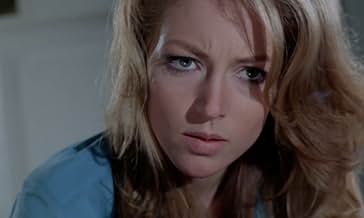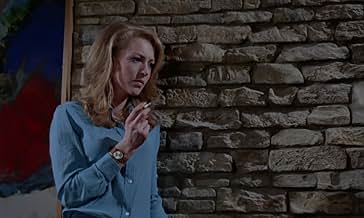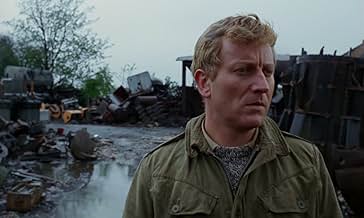VALUTAZIONE IMDb
6,9/10
2229
LA TUA VALUTAZIONE
Un gruppo di criminali britannici pianifica la rapina del treno della Royal Mail sulla rotta Glasgow-Londra.Un gruppo di criminali britannici pianifica la rapina del treno della Royal Mail sulla rotta Glasgow-Londra.Un gruppo di criminali britannici pianifica la rapina del treno della Royal Mail sulla rotta Glasgow-Londra.
- Regia
- Sceneggiatura
- Star
- Premi
- 1 vittoria in totale
Patrick Jordan
- Freddy
- (as Patrick Jordon)
Kenneth Farrington
- Seventh Robber
- (as Ken Farrington)
Roger Booth
- Detective
- (non citato nei titoli originali)
Ron Charles
- Seaman
- (non citato nei titoli originali)
Recensioni in evidenza
This is true British gangster filming at its best.
The opening robbery and car chase, from Hatton Garden around central London and out to Maida Vale, is utterly brilliant and that's years before the French Connection or anything like that. Peter Yates was brilliant. In fact, if they re-make any British gangster film these days it should be Robbery, not Get Carter or anything like that.
The music is utterly brilliant, too. Johny Keating should be up there with the likes of John Barry, John Williams, etc. He seems to have done virtually nothing after this film.
Even the faked scenes of the train robbery itself are great despite the London-Glasgow express train really being another train on a branch line travelling at about 30 mph.
They could've made a sequeal to this, too, with the legendary and fantastic Stanley Baker shown in the New World. Same goes for the late Barry Foster.
The opening robbery and car chase, from Hatton Garden around central London and out to Maida Vale, is utterly brilliant and that's years before the French Connection or anything like that. Peter Yates was brilliant. In fact, if they re-make any British gangster film these days it should be Robbery, not Get Carter or anything like that.
The music is utterly brilliant, too. Johny Keating should be up there with the likes of John Barry, John Williams, etc. He seems to have done virtually nothing after this film.
Even the faked scenes of the train robbery itself are great despite the London-Glasgow express train really being another train on a branch line travelling at about 30 mph.
They could've made a sequeal to this, too, with the legendary and fantastic Stanley Baker shown in the New World. Same goes for the late Barry Foster.
Robbery is directed by Peter Yates and adapted to screenplay by Yates, Edward Boyd and George Markstein from The Robber's Tale written by Peta Fordham. It stars Stanley Baker, James Booth, Frank Finlay, Joanna Pettet, Barry Foster, William Marlowe, George Sewell and Clinton Greyn. Music is by Johnny Keating and cinematography by Douglas Slocombe.
As tough as steel toe capped docker boots, Robbery is a fictionalised take on the Great Train Robbery of 1963 that saw the London to Glasgow mail train stripped of its £2.6 million hold. It was a robbery seen as daring and near genius in its meticulous planning and execution. Coming out just four years after the real event, Peter Yates' film takes the skeleton facts of the real robbery and builds a dramatic carcass around it.
Film is structured in three stages, firstly is a scintillating diamond robbery that introduces us to some of the major players in the train robbery to follow. This is fronted by an adrenalin pumping car chase that stands as one of the finest ever put to celluloid, kinetic and with inventive use of camera work, it's set to almost no dialogue and is car choreography of the highest order. Steve McQueen was so impressed he promptly arranged to have Yates summoned to Hollywood to direct Bullit.
The second part of the picture and the meaty middle section of the tale, concentrates on the movers and shakers in the robbery. The planning of the event, the gathering of various criminal London factions, their meetings, arguments, frets and worries, even a scenario that sees ringleader Paul Clifton (Baker) arrange to have a currency expert broken out of prison. All the time while this is happening, as the various crooks move about various London locations such as bars, clubs, football grounds and abodes etc, we are also following the police side of things. The kicker here is that the police, led by Inspector George Langdon (Booth), know that something big is being planned, and by who, but they don't know what and have to bite their nails waiting for a break or for the event to actually happen!
Finally the third part is the robbery itself and the aftermath involving the robbers hiding out, scattering to the wind as the cops close in. The robbery is edge of the seat brilliance, cunning in its execution and filmed with such gritty realism it really grabs the attention wholesale. The climax played out at a disused airfield is also exciting and such is the fact that previously we have been firmly tuned into the main characters on both sides of the law, we are fully immersed into what will become of them all.
Yates and his cast are on fine form, with Baker and Booth excellent, in fact the film positively bristles with British beef at times! Slocombe's photography strips it back to basics, suitably so to imbue that documentary feel, and Keating's score thunders away like a criminal accomplice at times. While fans of 60s London as a period backdrop can't fail to feel well fed after film's end. Pettet's wife of Clifton angle feels under nourished, and the whole middle section inevitably fails to sustain the tempo created by that exhilarating first quarter of film, but small irritants only they be. For Robbery is a British Bulldog of a movie, its biceps bulging, its brain clicking into gear, in short, it's a cracker! 8/10
As tough as steel toe capped docker boots, Robbery is a fictionalised take on the Great Train Robbery of 1963 that saw the London to Glasgow mail train stripped of its £2.6 million hold. It was a robbery seen as daring and near genius in its meticulous planning and execution. Coming out just four years after the real event, Peter Yates' film takes the skeleton facts of the real robbery and builds a dramatic carcass around it.
Film is structured in three stages, firstly is a scintillating diamond robbery that introduces us to some of the major players in the train robbery to follow. This is fronted by an adrenalin pumping car chase that stands as one of the finest ever put to celluloid, kinetic and with inventive use of camera work, it's set to almost no dialogue and is car choreography of the highest order. Steve McQueen was so impressed he promptly arranged to have Yates summoned to Hollywood to direct Bullit.
The second part of the picture and the meaty middle section of the tale, concentrates on the movers and shakers in the robbery. The planning of the event, the gathering of various criminal London factions, their meetings, arguments, frets and worries, even a scenario that sees ringleader Paul Clifton (Baker) arrange to have a currency expert broken out of prison. All the time while this is happening, as the various crooks move about various London locations such as bars, clubs, football grounds and abodes etc, we are also following the police side of things. The kicker here is that the police, led by Inspector George Langdon (Booth), know that something big is being planned, and by who, but they don't know what and have to bite their nails waiting for a break or for the event to actually happen!
Finally the third part is the robbery itself and the aftermath involving the robbers hiding out, scattering to the wind as the cops close in. The robbery is edge of the seat brilliance, cunning in its execution and filmed with such gritty realism it really grabs the attention wholesale. The climax played out at a disused airfield is also exciting and such is the fact that previously we have been firmly tuned into the main characters on both sides of the law, we are fully immersed into what will become of them all.
Yates and his cast are on fine form, with Baker and Booth excellent, in fact the film positively bristles with British beef at times! Slocombe's photography strips it back to basics, suitably so to imbue that documentary feel, and Keating's score thunders away like a criminal accomplice at times. While fans of 60s London as a period backdrop can't fail to feel well fed after film's end. Pettet's wife of Clifton angle feels under nourished, and the whole middle section inevitably fails to sustain the tempo created by that exhilarating first quarter of film, but small irritants only they be. For Robbery is a British Bulldog of a movie, its biceps bulging, its brain clicking into gear, in short, it's a cracker! 8/10
A gang of crooks plan a big score and use other smaller robberies as a means of financing it. Clearly inspired by the Great Train Robbery of the 1960's, although the facts are shifted - maybe made for legal reasons?
This is the kind of film that I loved as child. And still do. Live-for-today criminals that stop at nothing to get their hands on the loot and heaven help anybody that gets in the way. While having the plus of the robbery and the usual gang of rent a villains it does minor variations on the expected while not leaving the well trodden track.
The car chase through central London is one of the best things here and inspired many impersonations. Indeed it is probably the first homicidal chase through a big city seen on screen.
(The chase in Bullet is a complete rip-off - although Peter Yates directed this as well!)
As another viewer noticed the dialogue is dated (no swearing!) and the thing lacks a clear hero and villain. All-in-all like watching one of the better episodes of The Sweeney (a UK TV series) and a good guide to London -- as it was back in the Swinging Sixties.
This is the kind of film that I loved as child. And still do. Live-for-today criminals that stop at nothing to get their hands on the loot and heaven help anybody that gets in the way. While having the plus of the robbery and the usual gang of rent a villains it does minor variations on the expected while not leaving the well trodden track.
The car chase through central London is one of the best things here and inspired many impersonations. Indeed it is probably the first homicidal chase through a big city seen on screen.
(The chase in Bullet is a complete rip-off - although Peter Yates directed this as well!)
As another viewer noticed the dialogue is dated (no swearing!) and the thing lacks a clear hero and villain. All-in-all like watching one of the better episodes of The Sweeney (a UK TV series) and a good guide to London -- as it was back in the Swinging Sixties.
Robbery is for me a semi-documentary / thriller based on the Great Train Robbery of 1963. The location of the actual heist, on a bridge crossing a country lane bears similarity to the real robbery. The film moves around much of 60s London in the first part, during which time the gang are robbing to gain funds, plus planning the main robbery.
The gangs' meeting on the terraces during a Leyton Orient match is well screened; Stanley Baker becomes so heated during their discussion he misses a great run and shot against the crossbar shown from the pitch!
As for the central characters, Stanley Baker superbly plays "Mr Big" Paul Clifton, who is a character that the viewer never quite gets to know the limits. For example he tells the gang "we don't need guns, the police don't carry them"; later his wife finds his revolver at home, when quizzed he says "the gun is because I not going back inside (prison)".
William Marlowe cleverly plays Clifton's "number 2" Dave Aitken, who is clearly "nice cop" versus Clifton's "bad cop" in terms of running the gang.
As with the real train robbery, the gang make a successful robbery; however mistakes made during hideway contribute to their eventual capture. Not least when their contact who "cleans up" the getaway vehicles is apprehended at an airport leaving the UK with about £50K stuffed up his coat - his capture enables the police to set up a successful trap for the rest of the gang.
The ending of the film is probably a slight movement forward from many 1950s movies where the gang are all caught - the ending to Robbery slightly leaves the viewer guessing. This is a film for enthusiasts of films of past years, who may like to spot London landmarks.
The gangs' meeting on the terraces during a Leyton Orient match is well screened; Stanley Baker becomes so heated during their discussion he misses a great run and shot against the crossbar shown from the pitch!
As for the central characters, Stanley Baker superbly plays "Mr Big" Paul Clifton, who is a character that the viewer never quite gets to know the limits. For example he tells the gang "we don't need guns, the police don't carry them"; later his wife finds his revolver at home, when quizzed he says "the gun is because I not going back inside (prison)".
William Marlowe cleverly plays Clifton's "number 2" Dave Aitken, who is clearly "nice cop" versus Clifton's "bad cop" in terms of running the gang.
As with the real train robbery, the gang make a successful robbery; however mistakes made during hideway contribute to their eventual capture. Not least when their contact who "cleans up" the getaway vehicles is apprehended at an airport leaving the UK with about £50K stuffed up his coat - his capture enables the police to set up a successful trap for the rest of the gang.
The ending of the film is probably a slight movement forward from many 1950s movies where the gang are all caught - the ending to Robbery slightly leaves the viewer guessing. This is a film for enthusiasts of films of past years, who may like to spot London landmarks.
8emm
What obviously is a great (or maybe not-so-great depending on who to trust) film elsewhere on the world map, ROBBERY (1967) has since been into obscurity in the States. The print's a knockout! This may have helped launch future rip-offs of the burglar heist category, including the mellow-yellow LOOPHOLE. Anyone here who finds this will be glad that this is just one of the few kinds of movies that has never been seen quite often these days. It's a truly interesting find! Starting off with a long car chase, it becomes deeply involving with the story where Clifton runs a professional crook squad planning and attempting to rob a trainload of loot. You will not expect a fast-paced breeze through a simple little concept like stealing, but a very sharp plot makes this stand out, where one event leads to another. With a near-surprise finish, this is one domestic rarity that must be seen, and is highly recommended. Take it from me, you will be surprised at how many good movies are left in waiting for the eye.
Lo sapevi?
- QuizIt was the realistic car chase through the streets of London in this picture, that led to director Peter Yates doing another car chase in San Francisco a year later. Steve McQueen personally wanted Yates for what turned out to be his highest grossing film Bullitt (1968).
- BlooperWhen the traffic warden puts the gas canister in the car, a white cable can be seen draping from the inside of the door and this is seen to be connected to the device as he removes it from his bag. There is no sign of the cable in the following close-up shot from his point of view.
- Citazioni
Paul Clifton: We're talking about millions of pounds now. We're talking about road blocks, car searches, house raids, shakedowns. They'll know who pulled the job. Without the money, they can't prove anything.
- ConnessioniFeatured in Film Review: Film Review (1967)
I più visti
Accedi per valutare e creare un elenco di titoli salvati per ottenere consigli personalizzati
Dettagli
- Data di uscita
- Paese di origine
- Lingua
- Celebre anche come
- Robbery
- Luoghi delle riprese
- Leyton Stadium, Brisbane Road, Leyton, Londra, Inghilterra, Regno Unito(Paul Clifton plans the train robbery with Frank, Dave, Ben and Don during a football match)
- Aziende produttrici
- Vedi altri crediti dell’azienda su IMDbPro
Contribuisci a questa pagina
Suggerisci una modifica o aggiungi i contenuti mancanti

Divario superiore
By what name was Rapina al treno postale (1967) officially released in India in English?
Rispondi



































